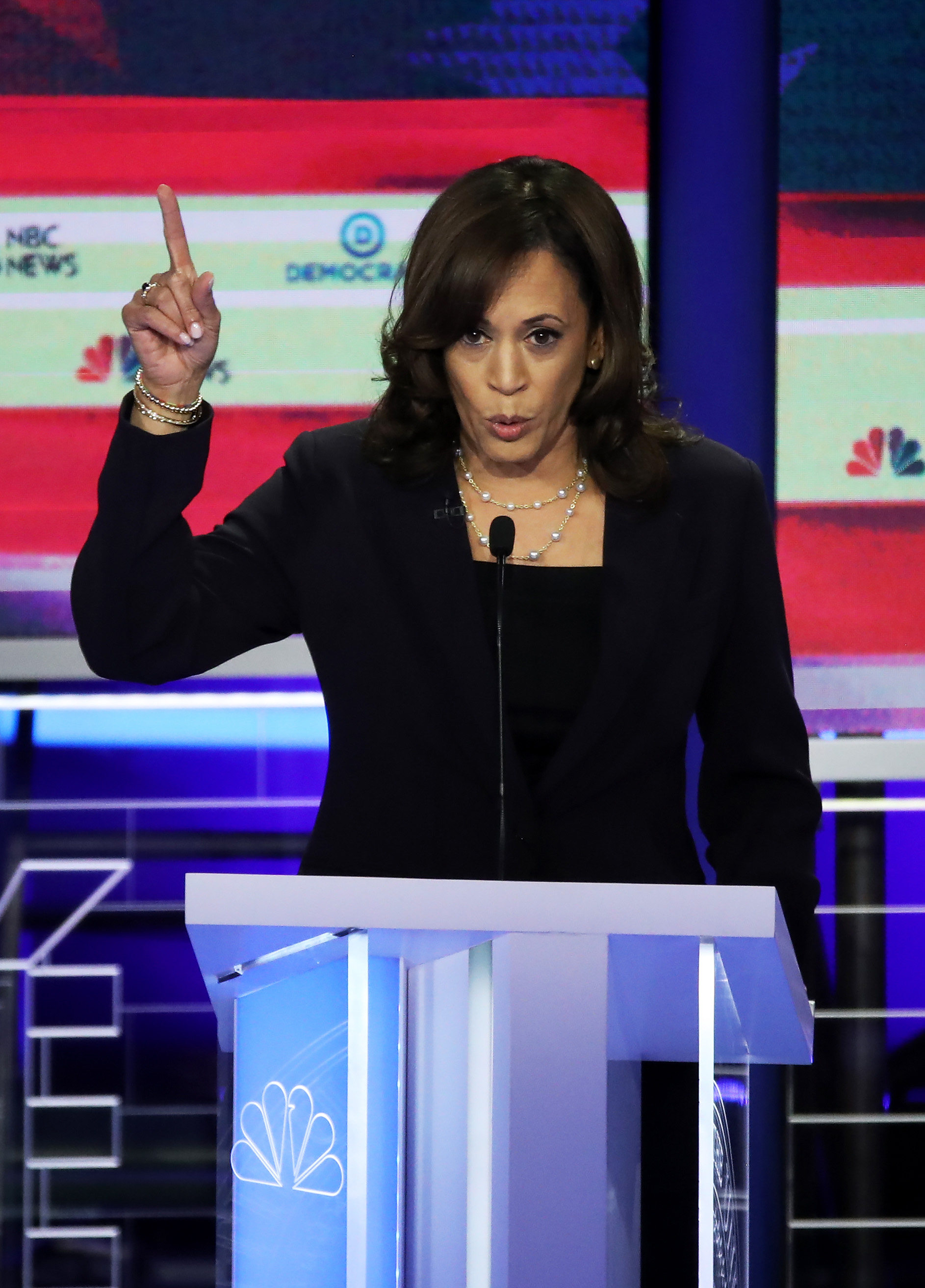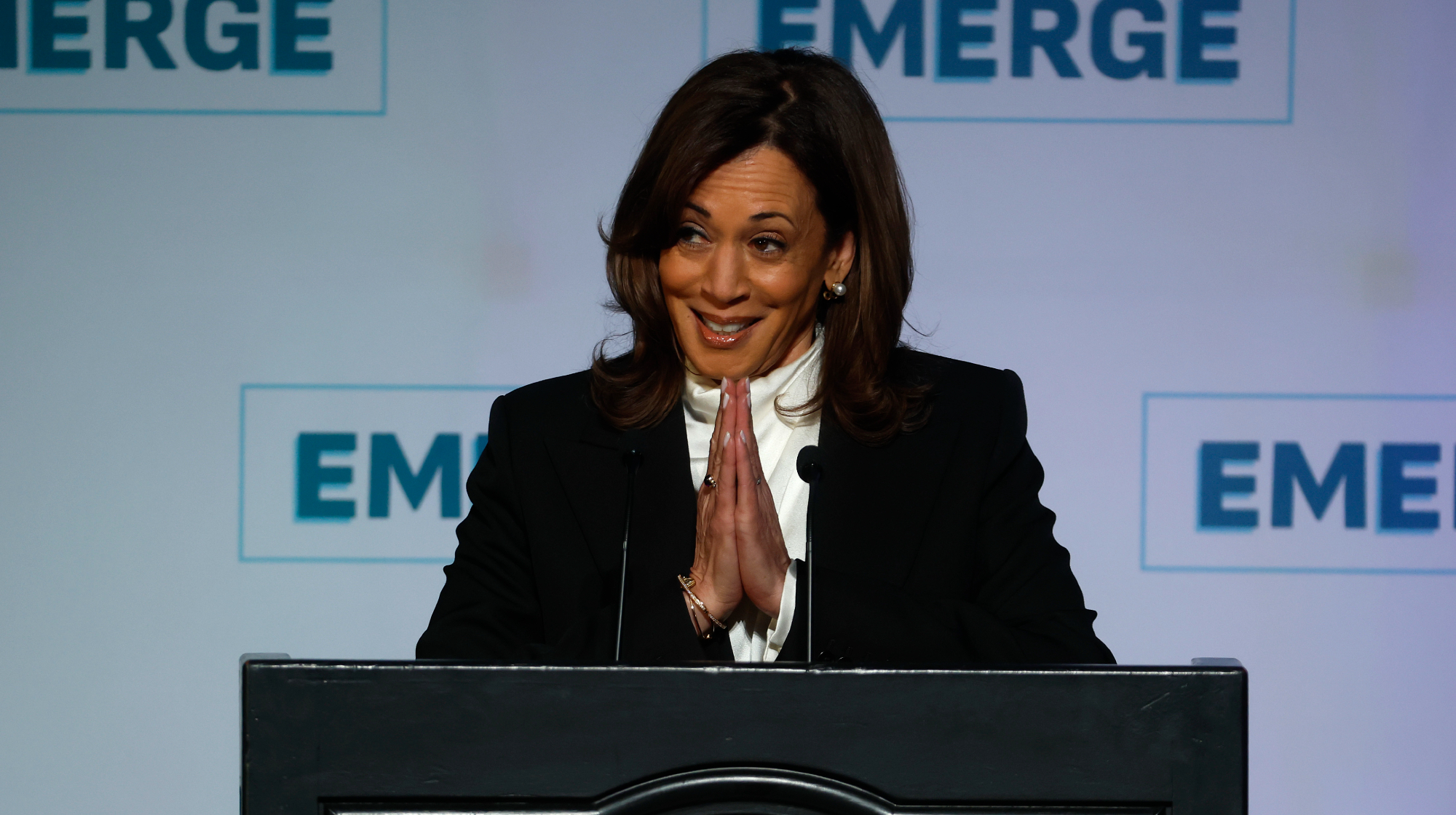Kamala Harris won, Biden lost, and Marianne Williamson is groovy
Takeaways from the Democratic debate, part 2


A free daily email with the biggest news stories of the day – and the best features from TheWeek.com
You are now subscribed
Your newsletter sign-up was successful
Unlike Wednesday's de facto underdog contest, Thursday night's main-stage Democratic presidential debate had a clear and obvious winner. It was not the ostensible moderate frontrunner, Joe Biden, nor the second-place progressive, Bernie Sanders. It was the person many of us thought had the best chance of capturing the Democratic establishment before it became clear that neither his age nor his record of handsiness was going to keep Biden from running in the first place.
Kamala Harris made it clear that this is still the lane in which is she seeking to run. But she managed to do so while making rhetorical inroads with progressives. She was the only person on the stage willing to flirt with Medicare-for-all while calling for tax cuts. She spoke effectively against President Trump without making her opposition to him the be-all end-all of her appeal. Her response to Biden's prevarication about federal busing was masterful. This could be the only genuine breakout performance we have seen in one of these debates in many years.
After Harris the fall-off was rather steep for me, with one exception. I am speaking of Marianne Williamson, the spiritualist author and guru whose far-out stylings were the only amusing thing about the evening's proceedings. I did not walk away from the debate with the slightest idea what she believes about immigration, health care, foreign policy, or any other relevant issue, but I was heartened by her unabashed Haight-Ashbury schtick. A lot of it was mumbo jumbo, but it was beautiful mumbo jumbo. "You have harnessed fear for political purposes," she said, addressing Trump. "I am going to harness the power of love. I will meet you on that field. And love will win." To quote Williamson herself: "Girlfriend, you are so on!"
The Week
Escape your echo chamber. Get the facts behind the news, plus analysis from multiple perspectives.

Sign up for The Week's Free Newsletters
From our morning news briefing to a weekly Good News Newsletter, get the best of The Week delivered directly to your inbox.
From our morning news briefing to a weekly Good News Newsletter, get the best of The Week delivered directly to your inbox.
I did not find Bernie Sanders especially compelling, not least because he continued to show us that, whatever the strength of his principles, he is incapable of speaking in anything except soundbites. He had only two great moments all evening. The first was when he rejected the premise of the stupidest of Chuck Todd's many stupid questions, one that involved singling out a single issue that mattered to the exclusion of all others. The second was near the very end when he mentioned the crisis in Yemen. He was the only person to do so all evening.
Andrew Yang's first rather long-winded response to the first question he fielded was cogent and interesting but otherwise he spoke very little and did not make the most of the few opportunities he had. Part of the problem is that his wonkish candidacy is fundamentally unsuited to the soundbite approach. It is easy to imagine Yang debating someone like Jeb Bush at length on the merits of universal basic income or the feasibility of imposing a value-added tax. In a moronic free-for-all like these made-for-TV events, he has no chance.
The only other person who came close to standing out was Eric Swalwell, the California congressman. Those of us who wondered which, if any candidate, would be the first to take one for the team by attacking Biden's age and record should not have been surprised to find that it was someone with absolutely nothing to lose. Swalwell talked a great deal of nonsense ("When I'm not changing diapers, I'm changing Washington" — can Mrs. Swalwell confirm this?), but his early quip about passing the torch made the rest of the evening's anti-Biden action possible. Will it help his own candidacy? Probably not.
The rest of the field ranged from unmemorable to disastrous. Pete Buttigieg's appeal is premised on two things, his being the first openly gay Democratic presidential candidate in history and his experience as the mayor of a small-sized city. He fumbled numerous opportunities to make use of the latter and did not once allude to the former. John Hickenlooper raved about the perils of socialism. Not once but twice he reached towards what I suspect his staff has identified as the Gen X Guided by Voices boxed set-buying demographic by saying "I am a scientist." Kirsten Gillibrand insisted over and over again that she has "the most comprehensive approach" to various mostly unspecified issues, at one point claiming that "experts," themselves unnamed, "agree" with her. She also ranted about abortion and gave the impression that she believes high-school students ought to be given the vote. Michael Bennet looked confused and pained throughout.
A free daily email with the biggest news stories of the day – and the best features from TheWeek.com
Just as there was a clear winner in Harris, there was an obvious loser on Thursday night whose performance was the most embarrassing thing we have seen on a debate stage since Rick Perry's infamous "oops" moment in 2011. As far as I am concerned, Joe Biden all but squandered his lead with his rambling, confused, half-hearted, noncommittal gibberish. If I were one of the moderators, I would have jumped in during each of the idiotic "raise your hands" segments to ask the former vice president whether he agreed, disagreed, or just needed to use the boys' room. Does he really want to pull out of Afghanistan, against the advice of the entire foreign policy establishment but in keeping with the (so far thwarted) ambitions of President Trump? What did he mean when he said "I got the number of clips in a gun banned"? And why would ever argue in front of a national audience of millions in the Year of Our Lord 2019 that federal bussing was a states' rights issue and that he stood by his refusal to endorse it nearly five decades ago? The mind reels.
Harris won, Williamson glowed with psychedelic energy, Bernie survived. Biden made the case that he does not belong in this campaign.
Matthew Walther is a national correspondent at The Week. His work has also appeared in First Things, The Spectator of London, The Catholic Herald, National Review, and other publications. He is currently writing a biography of the Rev. Montague Summers. He is also a Robert Novak Journalism Fellow.
-
 Local elections 2026: where are they and who is expected to win?
Local elections 2026: where are they and who is expected to win?The Explainer Labour is braced for heavy losses and U-turn on postponing some council elections hasn’t helped the party’s prospects
-
 6 of the world’s most accessible destinations
6 of the world’s most accessible destinationsThe Week Recommends Experience all of Berlin, Singapore and Sydney
-
 How the FCC’s ‘equal time’ rule works
How the FCC’s ‘equal time’ rule worksIn the Spotlight The law is at the heart of the Colbert-CBS conflict
-
 The billionaires’ wealth tax: a catastrophe for California?
The billionaires’ wealth tax: a catastrophe for California?Talking Point Peter Thiel and Larry Page preparing to change state residency
-
 Bari Weiss’ ‘60 Minutes’ scandal is about more than one report
Bari Weiss’ ‘60 Minutes’ scandal is about more than one reportIN THE SPOTLIGHT By blocking an approved segment on a controversial prison holding US deportees in El Salvador, the editor-in-chief of CBS News has become the main story
-
 Has Zohran Mamdani shown the Democrats how to win again?
Has Zohran Mamdani shown the Democrats how to win again?Today’s Big Question New York City mayoral election touted as victory for left-wing populists but moderate centrist wins elsewhere present more complex path for Democratic Party
-
 Millions turn out for anti-Trump ‘No Kings’ rallies
Millions turn out for anti-Trump ‘No Kings’ ralliesSpeed Read An estimated 7 million people participated, 2 million more than at the first ‘No Kings’ protest in June
-
 Democrats: Harris and Biden’s blame game
Democrats: Harris and Biden’s blame gameFeature Kamala Harris’ new memoir reveals frustrations over Biden’s reelection bid and her time as vice president
-
 ‘We must empower young athletes with the knowledge to stay safe’
‘We must empower young athletes with the knowledge to stay safe’Instant Opinion Opinion, comment and editorials of the day
-
 Harris rules out run for California governor
Harris rules out run for California governorSpeed Read The 2024 Democratic presidential nominee ended months of speculation about her plans for the contest
-
 Ghislaine Maxwell: angling for a Trump pardon
Ghislaine Maxwell: angling for a Trump pardonTalking Point Convicted sex trafficker's testimony could shed new light on president's links to Jeffrey Epstein
